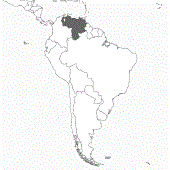Tough Adjustment
GUETERSLOH/CARACAS (Own report) - The Bertelsmann Foundation is calling for a "tough adjustment" of Venezuela's economic and social policies and is demanding "external assistance" from the USA and the European Union. This influential think tank, with the Bertelsmann Media Systems holding a majority of shares, explains that the Venezuelan president Hugo Chávez' "clearly anti-market economic policy" not only threatens the "stability" of Latin America, but is also "tempting" other poverty-stricken regions to take similar "radical" measures. These statements come from the recently published updated edition of the "Bertelsmann Transformation Index," which assesses nations outside the prosperous Western centers on their willingness to carry out a "transformation" on the basis of Western specifications. This is one of the documents used by the German government to evaluate its own foreign policy. The Bertelsmann Foundation is demanding that a "counter-strategy" be developed against the measures taken by the elected Venezuelan president and his South American coalition partners.
The Bertelsmann Transformation Index (BTI), published recently for the third time (2003, 2006 and 2008), makes an assessment of the "level of socioeconomic development" of altogether 125 Latin American, African, Asian and Eastern European nations' "transition processes [toward] democracy and market economic systems" [1] According to the Bertelsmann Foundation, the BTI is being used by international financial institutions, such as the World Bank as well as the German government to evaluate "development cooperation." In this context, the attacks on the Venezuelan government made in this document as well as its demands take on a much greater significance.
"Caudillo"
In its BTI, the Bertelsmann Foundation accuses the Venezuelan President, Hugo Chávez, who they defame as a "populist caudillo," of carrying out a "socialist revolution." According to this document, this manifests itself in the "nationalization of companies in strategic sectors such as telecommunications, utilities and steel" as well as the Chávez government's erosion of the concept of "private property" by distributing fallow arable land to landless farmers. According to Bertelsmann's BTI, the Venezuelan government is demonstrating not only a "lack of commitment" to "the idea" of market economy but is even "plainly opposed" to it.
Temptation
Bertelsmann evidently sees a particular danger in the possibility that other Latin American States such as Bolivia and - according to BTI - Argentina, could follow Venezuela's lead. Confronted with extreme poverty and exclusion from public life of broad sectors of the population, the "temptation" to support a "radical" policy is "understandable," according to the BTI. Venezuela is also using its oil-fueled affluence as a "political weapon," as a "vehicle for boosting socialism" in Latin America and beyond, the authors write. As evidence the authors use the examples of the delivery of bargain priced oil to Cuba, Nicaragua or poor neighborhoods of Boston, New York and London, as well as Caracas' cooperation with the re-nationalized Bolivian oil industry.
Counter-Strategy
Because Venezuelan President Chávez does not limit "his vision of socialism" to the confines of his country, but "seeks to extend it to Latin America as well as the rest of the world", the Bertelsmann Foundation is seeking to "design and implement an effective counter-strategy". The Venezuelan opposition has shown its "inability" to do so, the report writes of the fragmented former pro-Western government circles. But Caracas could loose its influence particularly through "determined" US and EU trade overtures toward Latin American countries. Venezuela’s economic and social policies require "tough adjustments", the BTI authors write. Under the present circumstances, this is nothing other than a plea for "regime change".
Susceptible
In this context, the principles of the democratic decision-making process, otherwise gladly named by the Bertelsmann Foundation as an indicator of "good governance," is negatively assessed. As the BTI explains, the exercise of "civil rights" by the population "led to massive mobilizations in the countries of the Andes" and therefore "strengthened the susceptibility for populist tendencies." Where "new social movements came to power" - for example in Bolivia -, they "sometimes radically" turned against market economic "reforms". The Bertelsmann Foundation alleges that this has been a "destabilizing factor" throughout the continent.
Model
The Bertelsmann Foundation still considers Chile as a model for Latin America. Salvador Allende, the elected socialist President of Chile was killed in 1973 on the orders of General Augusto Pinochet. Pinochet established a brutal regime of terror and - to the applause of German enterprises - imposed a neo-liberal economic order in the country. Through Pinochet’s restructuring laws, Chile became one of the countries with the world’s highest prosperity gap, [2] which is still characterizing the Chilean economic system, praised by the Bertelsmann Foundation.
[1] Sämtliche Zitate entstammen den folgenden beiden Publikationen: Bertelsmann-Stiftung (Hg.): Bertelsmann Transformation Index 2008. Politische Gestaltung im internationalen Vergleich, Gütersloh 2008. BTI 2008: Venezuela Country Report (Anlage zur Buchpublikation auf CD-ROM). See also Indispensable Human Sacrifice
[2] see also Warnings
